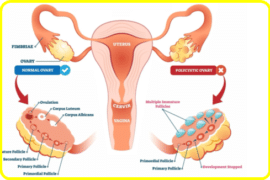Women of their reproductive age commonly confront two major problems Polycystic Ovary Syndrome or Polycystic Ovarian Disease The reproductive organs particularly the ovaries are affected by these conditions These reproductive conditions would irregularly produce hormones like progesterone and estrogen leading to the irregular menstrual cycle Due to similar symptoms many confuse these two as the same In reality there are some major differences between PCOS and PCOD
Those with PCOS often experience irregular menstrual cycles They produce higher than normal amounts of male hormones like androgens
Common Symptoms of PCOD and PCOS
Polycystic Ovarian Disease is common for women producing immature or partially mature eggs in larger numbers. Misdiagnosis or ignorance may severe the condition, resulting in the formation of cysts in ovaries. PCOD can further cause irregular menstrual cycles infertility obesity or weight loss By choosing a healthy PCOD diet plan you can take precautions against this ovarian disease Usual symptoms of PCOD include:
● Irregular periods
● Hirsutism
● Weight gain
● Hair loss
PCOS is a metabolic disorder Women with PCOS suffer from the consequences of hormonal imbalance in the reproductive years of 12-51 The immediate symptoms of PCOD or PCOS are somehow similar However among the major differences between PCOS and PCOD there is a greater severity of the former than the latter
If left untreated complications may arise with symptoms like:
● Fatigue
● Depression or anxiety
● Diabetes
● Infertility
● Cardiovascular risks
● Ovarian Cysts
Common Differences between PCOS and PCOD
Both PCOS and PCOD are reproductive disorders However there are significant
Common differences between PCOS and PCOD:
| PCOS | PCOD |
| PCOS is a metabolic disorder more severe than PCOD Due to misdiagnosis and ignorance it can lead to anovulation stopping the ovaries from producing eggs | PCOD, as a common condition, produces many immature or partially mature eggs. It occurs due to poor lifestyle obesity hormonal imbalance and stress. |
| PCOS women fail to ovulate regularly affecting fertility in women. | PCOD does not strongly affect fertility in women. With little medical help women having PCOD can still conceive. |
| The Ovarian Syndrome leads to severe complexities, like high BP, diabetes, and cardiovascular diseases. | No serious complications as such. |
PCOD and PCOS: Healthy Diet Management
PCOS and PCOD are clinically different. But for good, by following a healthy diet plan, both conditions can be controlled. A strict PCOS and PCOD diet plan helps in avoiding junk or processed foods and reducing weight. Regularly try to intake:
● More consumption of high-fiber foods. Vegetables, including cauliflower, broccoli, Brussels sprouts, red leaf lettuce, green leafy veggies, and sweet potatoes, have higher fiber content.
● Lean protein food sources like fish, tofu, or chicken. Lean protein contents can be filling and nutritious dietary options.
● Anti-inflammatory foods include tomatoes, spinach, olive oil, kale, food enriched with omega-3 fatty acids like salmon and sardines, etc.
Foods to Avoid
From your PCOS or PCOD diet plan, you must get rid of certain food sources that are richer in refined carbohydrates. Such type of food causes further inflammation and should be limited significantly.
● Refined carbohydrate foods like white bread or sugary desserts.
● Foods that have lower fiber content including noodles or pasta, semolina durum flour items.
● Avoid consumption of beverages or sodas which are high in sugar content.
By following a doctor-prescribed healthy PCOS or PCOD diet plan along with a daily share of exercises, you can control ovarian disease.
FAQ
What are the causes behind PCOS and PCOD?
The exact causes behind PCOD and PCOS are still unknown, but possessing them genetically is the most viable reason. PCOS occurs due to low-grade inflammation, excessive male hormone production, and insulin production. On the other side, PCOD is common due to stress, unhealthy lifestyle, and obesity.
End Thoughts
To sum up, women of reproductive age face both PCOD and PCOS commonly. Due to the lack of awareness, woken confused them as the same. But they are different. Such confusion gradually leads to misdiagnosis. The above article mentions the major differences between PCOS and PCOD. Fortunately, both reproductive disorders can be controlled by leading a healthy lifestyle and following nutritious diet plans.


